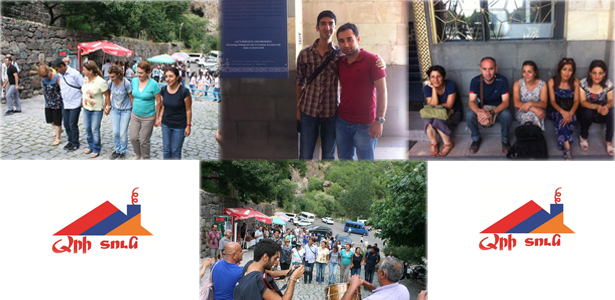“Ari Tun-2014”. Return to the identity. Diyarbakirinas live with Armenia ….”

Janan Ekinji – My dad’s mother told me about my Armenian origin. At that time I was five years old. My ancestors were from Shapin-Garahisar. My grandma was telling us in details, how the Turks had displaced the Armenians from Shapin-Garahisar and killed, but they managed to escape. I liked Armenia very much, it has a unique beauty. Everything here is even more beautiful than I could imagine; no one can tell that, in terms of its civilization, it is worse than any European country. I liked the Republic Square, Cascade, the statute of Mother Armenian. I tasted the Armenian food, which were very delicious. Since early childhood, it has been my wish to come and see Armenia. It was my biggest dream.
Musa Alp – In those times, they were talking a lot about Armenians. My father would always listen to such programs and tell us about them. It was him, who told us that the Armenian nation was subjected to cruel mass killing by Turks, and my dad’s stories would upset us. “We are the generations of massacred families”- was telling he – “We came from Sasun. And now we need to preserve our family roots”.
Being for the first time in Armenia, I saw my dream homeland; I am happy for being on the Mother land. All of us extend our deep gratitude to the RA Ministry of Diaspora for affording us this exceptional opportunity of seeing Armenia. The policy adopted by it in relation to Diaspora Armenians simply deserves appreciation.
Rihan Akgyun – My mother’s relatives had Kurdish origin, and my father’s side is of Armenian origin. They were living in Turkish village Silvan, dealing with carpentry – timber processing. This is my first visit to Armenia, and, in this regard, my excitement is incomprehensible. During the days of my sojourn here, I feel more closely tied to Armenia. For many times I had tried to visit and see my historical Homeland, but I failed. When I leant that the RA Ministry of Diaspora has such a patriotic program, I immediately agreed to participate in “Ari Tun” program. I was very much excited when visiting Tsitsernakaberd. That brought back to me the scenes and stories read by me about the Armenian Genocide and told by my parents.
Selim Agtash – I am originally from Sasun. There my ancestors were dealing with carpentry. In view of security issues, my parents wouldn’t tell me, before I turned 16, that I am an Armenian. My family decided that I am going to continue my education in Armenia. I came to Armenia, and my mind has been made up, as I had an opportunity to get to know the conditions of the local educational institutions more closely. I want to study the Armenian history. The first step for this is learning Armenian. No word is able to describe my feelings and emotions I have about Armenia; they have been accumulated in my soul. Through these days, I was able to find my relatives in Yerevan and Ashnak village and I am happy for this.
Mustafa Ilyan – While my name is Mustafa, after being baptized I was renamed Stepan, thus bearing a new name, of which I am proud. During the Armenian genocide my relatives found refuge in Aleppo region, and part of them survived, and the other part was martyred as a result of the crime committed by the Turks. My parents used to tell me about the sufferings experienced by the Armenian people. Here we are received like natives, people approach us, get familiar, and ask questions, which is very much encouraging. To me, Armenia is a developed and clean country. Knowing that I have an opportunity to visit Armenia, I made up my mind without any hesitation.
Prepared by Gevorg Chichiyan




 Արևելահայերեն
Արևելահայերեն Արևմտահայերեն
Արևմտահայերեն Русский
Русский






